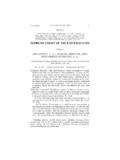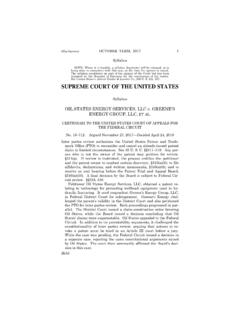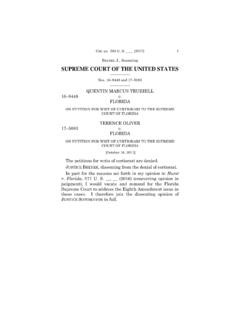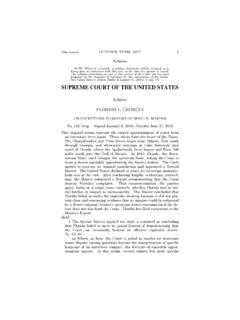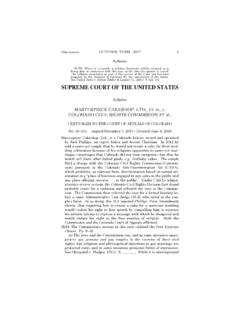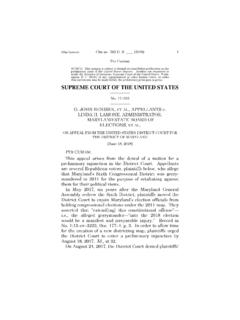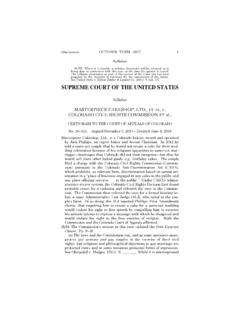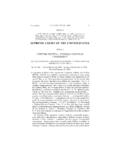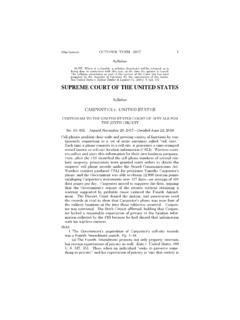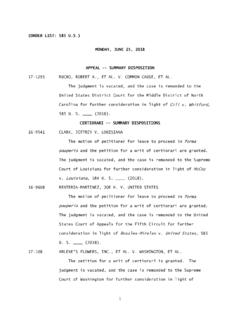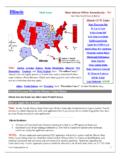Transcription of SUPREME COURT OF THE UNITED STATES
1 1 (Slip Opinion) OCTOBER TERM, 2007 Syllabus NOTE: Where it is feasible, a syllabus (headnote) will be released, as isbeing done in connection with this case, at the time the opinion is syllabus constitutes no part of the opinion of the COURT but has beenprepared by the Reporter of Decisions for the convenience of the reader. See UNITED STATES v. Detroit Timber & Lumber Co., 200 U. S. 321, 337.
2 SUPREME COURT OF THE UNITED STATES Syllabus DISTRICT OF COLUMBIA ET AL. v. heller CERTIORARI TO THE UNITED STATES COURT OF APPEALS FOR THE DISTRICT OF COLUMBIA circuit No. 07 290. Argued March 18, 2008 Decided June 26, 2008 District of Columbia law bans handgun possession by making it a crime to carry an unregistered firearm and prohibiting the registration of handguns; provides separately that no person may carry an unli-censed handgun , but authorizes the police chief to issue 1-year li-censes; and requires residents to keep lawfully owned firearms unloaded and disassembled or bound by a trigger lock or similar de-vice.
3 Respondent heller , a D. C. special policeman, applied to regis-ter a handgun he wished to keep at home, but the District refused. He filed this suit seeking, on Second Amendment grounds, to enjointhe city from enforcing the bar on handgun registration, the licensing requirement insofar as it prohibits carrying an unlicensed firearm inthe home, and the trigger-lock requirement insofar as it prohibits theuse of functional firearms in the home. The District COURT dismissed the suit, but the D.
4 C. circuit reversed, holding that the Second Amendment protects an individual s right to possess firearms and that the city s total ban on handguns, as well as its requirement thatfirearms in the home be kept nonfunctional even when necessary forself-defense, violated that right. Held: 1. The Second Amendment protects an individual right to possess a firearm unconnected with service in a militia, and to use that arm for traditionally lawful purposes, such as self-defense within the 2 53.
5 (a) The Amendment s prefatory clause announces a purpose, butdoes not limit or expand the scope of the second part, the operativeclause. The operative clause s text and history demonstrate that itconnotes an individual right to keep and bear arms. Pp. 2 22. (b) The prefatory clause comports with the COURT s interpretation 2 DISTRICT OF COLUMBIA v. heller Syllabus of the operative clause. The militia comprised all males physicallycapable of acting in concert for the common defense.
6 The Antifederal-ists feared that the Federal Government would disarm the people in order to disable this citizens militia, enabling a politicized standing army or a select militia to rule. The response was to deny Congress power to abridge the ancient right of individuals to keep and beararms, so that the ideal of a citizens militia would be preserved. Pp. 22 28. (c) The COURT s interpretation is confirmed by analogous arms-bearing rights in state constitutions that preceded and immediatelyfollowed the Second Amendment.
7 Pp. 28 30.(d) The Second Amendment s drafting history, while of dubious interpretive worth, reveals three state Second Amendment proposals that unequivocally referred to an individual right to bear arms. Pp. 30 32. (e) Interpretation of the Second Amendment by scholars, courts and legislators, from immediately after its ratification through the late 19th century also supports the COURT s conclusion. Pp. 32 47. (f) None of the COURT s precedents forecloses the COURT s interpre-tation.
8 Neither UNITED STATES v. Cruikshank, 92 U. S. 542, 553, nor Presser v. Illinois, 116 U. S. 252, 264 265, refutes the individual-rights interpretation. UNITED STATES v. Miller, 307 U. S. 174, does not limit the right to keep and bear arms to militia purposes, but rather limits the type of weapon to which the right applies to those used by the militia, , those in common use for lawful purposes. Pp. 47 Like most rights, the Second Amendment right is not is not a right to keep and carry any weapon whatsoever in any manner whatsoever and for whatever purpose: For example, con-cealed weapons prohibitions have been upheld under the Amendment or state analogues.
9 The COURT s opinion should not be taken to castdoubt on longstanding prohibitions on the possession of firearms byfelons and the mentally ill, or laws forbidding the carrying of fire-arms in sensitive places such as schools and government buildings, or laws imposing conditions and qualifications on the commercial sale of arms. Miller s holding that the sorts of weapons protected are those in common use at the time finds support in the historical traditionof prohibiting the carrying of dangerous and unusual weapons.
10 Pp. 54 56. 3. The handgun ban and the trigger-lock requirement (as applied toself-defense) violate the Second Amendment. The District s total ban on handgun possession in the home amounts to a prohibition on anentire class of arms that Americans overwhelmingly choose for the lawful purpose of self-defense. Under any of the standards of scru-tiny the COURT has applied to enumerated constitutional rights, this 3 Cite as: 554 U. S. ____ (2008) Syllabus prohibition in the place where the importance of the lawful defense of self, family, and property is most acute would fail constitutional muster.
